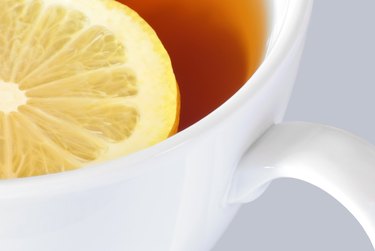
When you see the words "orange pekoe" (pronounced "orange peck-o"), you might imagine a steaming cup of tea with some serious citrus-y notes, but the term actually refers to the grade of tea and not the flavor. Teas are graded by size and orange pekoe is black tea of the highest grade, or quality.
When you see the words orange pekoe on a label, it means that the tea leaves are whole, instead of broken or ground up. While the grade can have an impact on the flavor, aroma and sweetness of the tea, it doesn't have an effect on the health benefits. In other words, orange pekoe cut black tea has the same health benefits as any other grade of black tea.
Video of the Day
Video of the Day
Healthy Compounds in Black Tea
All black tea, whether it's orange pekoe black tea or not, comes from the leaves of the Camellia sinensis L. plant. While tea doesn't contain much in terms of vitamins and minerals, it's loaded with other beneficial plant compounds that have a variety of health benefits. According to a May 2017 report in Critical Reviews in Food Science and Nutrition, some of these compounds include polyphenols, amino acids, volatile compounds and alkaloids.
The Harvard T.H. Chan School of Public Health breaks it down a little more by listing out the most beneficial polyphenols. They are:
- Flavonols – myricetin, quercetin, kaempferol
- Theaflavins – formed when black tea leaves are oxidized
Most of these polyphenols act as antioxidants and have a profound health-promoting effect when you consume them regularly.
Orange Pekoe Black Tea Benefits
One large review that was published in Molecular Nutrition and Food Research in June 2019 looked at lots of data on the health benefits of drinking black tea and found that regular consumption could reduce the risk of heart disease, stroke and diabetes. Researchers also reported that regular tea drinkers had lower rates of death from heart-related problems and death in general. This particular review defined "regular consumption" as 2 to 3 cups of black tea per day.
The study that was published in Critical Reviews in Food Science and Nutrition in May 2017 looked at the connection between black tea and cancer, specifically, and found that while more in-depth research is needed to uncover exactly how it works, black tea appears to prevent the development of certain cancers.
Another study that was published in an earlier, May 2015 issue of Critical Reviews in Food Science and Nutrition, reported that black tea can also:
- Lower cholesterol
- Reduce inflammation
- Decrease blood pressure
- Improve brain health
- Fight off infection
Black Tea and Weight Loss
According to a study that was published in Molecules in December 2016, black tea may also promote weight loss, even more effectively than green tea. The researchers in the study looked at how black tea affects metabolism of fat and found that similar to how weight loss medications work, black tea can reduce the absorption of fat molecules in the intestine. They also found that black tea can improve the way your body handles insulin and glucose, which can help combat obesity.
Read more: The Best Green Tea to Lose Weight
There are numerous different orange pekoe tea brands. Any high-end tea manufacturer likely has options for orange pekoe black tea, as well as the lower grades, with include broken orange pekoe (or BOP) and dust. If you're concerned about tea quality and grade, you can contact your favorite tea brands directly and see what they have to offer. For the most part, tea grades aren't listed on the mass-produced tea brands that you find readily available on grocery store shelves.
- Tea Exporters Association Sri Lanka: "Tea Grade Nomenclature"
- Critical Reviews in Food Science and Nutrition: "Tea and Its Consumption: Benefits and Risks"
- Critical Reviews in Food Science and Nutrition: "Black Tea: Phytochemicals, Cancer Chemoprevention, and Clinical Studies"
- Molecular Nutrition and Food Research: "Tea Consumption and Health Outcomes: Umbrella Review of Meta‐Analyses of Observational Studies in Humans"
- Harvard T.H. Chan School of Public Health: "Tea"
- Molecules: "Mechanisms of Body Weight Reduction by Black Tea Polyphenols"